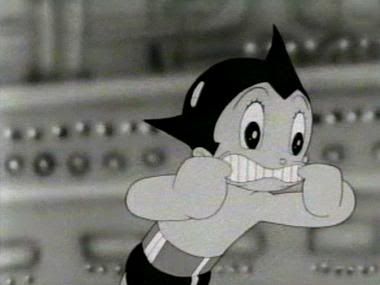"jeffbert" wrote:[QUOTE=Yuusha Senshi Godaiger;89582][QUOTE=jeffbert;49550]Nuku Nuku also has kokoro. However, Kokoro has nothing to do with resurrection. A robot that had been deactivated then reactivated does not equal a human that had been dead but was later resurrected. Although, in the new series, reactivation was a bit more than merely flipping the 'on' switch, it was more reminiscent of the first Frankenstein film, than Christ rising from the dead.
In the manga, there was a happy ending to the sad ending of the 60s anime, in which Atom was destroyed by the sun. The manga made a sequel to that story in which aliens found and repaired the melted hero. But repairing a burnt out robot and resurrecting a dead human are two very different things.
However, if you want to see it as echoing your religious beliefs, you should know that Tezuka was a Buddhist, and Astroboy has always reflected Buddhist values. All life is sacred to our little hero.

I'm a muslim and religion does NOT come to mind when I watch or think of Astro Boy.[/QUOTE]
Perhaps not, but that does not mean that the cartoons were void of religious content. I am not saying that they favored one or another religion (see my last post), but with titles that included The Eyes of Christ, Angel in the Alps, and Thirteen Mysterious Statues of God, just to name three, he was certainly not reluctant to include references to religion in his stories. True, the first of those titles I just listed was rejected by the English-language version, while the 3rd it renamed The Island of Mystery. #152, Robot Bombs had Atom disguised as a golden Buddha statue; but it came after season 2 & therefore was excluded from the ELV, as was #188 Tengu of Kurama, which was all about statues of Buddha. #171 Kutcher Forever featured a traditional Japanese funeral, & if I took some time, I could easily find more than a few more references.
Although we do not normally allow religious discussions here, we do allow discussions about how the Astroboy stories present religion. I would like your comments that relate to this topic as long as they remain relevant.
 [/QUOTE]
[/QUOTE]
You're right, religion can influence fictional works and heroes without the religion being the main theme, example a Kuwaiti published comic book that's available in English overseas titled The 99,the plot is about 99 teenagers from around the globe who each gain a unique super power. The 99 powers are influenced by the 99 attributes of Allah in Islam, however despite being influenced that part of Islam, the comic's author Dr. Naif Al-Mutawa has intentionally kept the faiths of the characters ambiguous in fact several members of the 99 are from non-muslim parts of the world. Dr Naif stated he did that because he saw the 99 attributes in Islam as being universal virtues.








